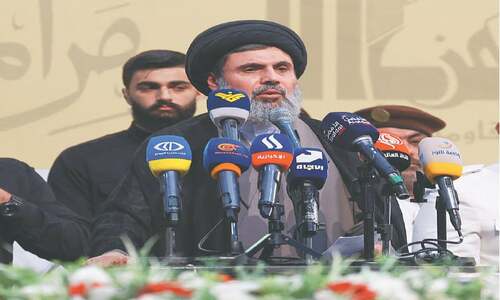
BEIRUT: Hezbollah announced on Tuesday the appointment of Sheikh Naim Qassem as head of the movement, succeeding Hassan Nasrallah, who was assassinated by Israel last month.
“Hezbollah’s (governing) Shura Council agreed to elect… Sheikh Naim Qassem as secretary general,” the group said in a statement, more than a month after Nasrallah’s demise.
Qassem has long operated in the shadow of Nasrallah, being appointed the group’s deputy leader in 1991.
Hashem Safieddine, the head of Hezbollah’s executive council, was initially tipped to succeed Nasrallah.
But he too was killed in an Israeli air strike on Beirut’s southern suburbs shortly after Nasrallah’s death.
Qassem was elected two days earlier, a source close to Hezbollah told AFP.
Speaking on condition of anonymity, the source said a new Shura Council would be elected after the war.
The council may then opt to elect a new leader or keep Qassem in the top post, the source said.
“We consider this election evidence of the party’s recovery from the targeting” of its leaders, Hamas said in a statement, pledging “support for the new leadership”.
But Israel quickly hit back, with Defence Minister Yoav Gallant warning in a post on X that Qassem’s appointment would not last long.
“Temporary appointment. Not for long,” Gallant posted on X with a photo of Qassem.
In his most recent speech on Oct 15, Qassem said a ceasefire was the only way Israel could guarantee the return of its residents to the north.
Who is Sheikh Naim Qassem?
Qassem, 71, was one of Hezbollah’s founders in 1982 and had been the party’s deputy secretary general since 1991, the year before Nasrallah took the helm.
He was born in Beirut in 1953 to a family from the village of Kfar Fila, on the border with Israel.
He was appointed as Hezbollah’s deputy chief by Abbas al-Musawi, who was killed by an Israeli helicopter attack the following year.
Qassem was the most senior Hezbollah official to continue making public appearances after Nasrallah largely went into hiding following the 2006 flare-up with Israel.
He has long been one of the group’s leading spokesmen, conducting interviews with foreign media, even as cross-border hostilities with Israel raged over the last year.
Since Nasrallah’s killing in a massive Israeli air strike on September 27, Qassem has made three televised addresses, speaking in more formal Arabic than the colloquial Lebanese favoured by Nasrallah.
Published in Dawn, October 30th, 2024














































Dear visitor, the comments section is undergoing an overhaul and will return soon.